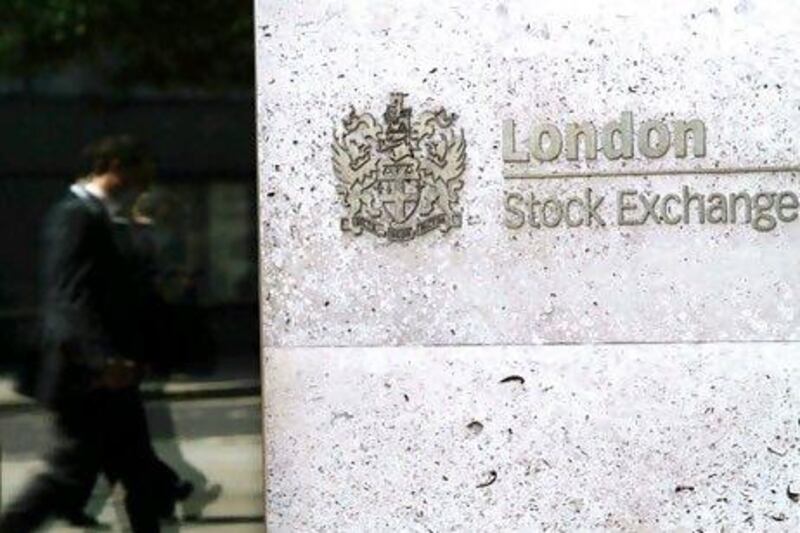Sound corporate governance is good for you, isn't it? Not if the experience of Eurasian Natural Resources Corporation (ENRC) on the London Stock Exchange (LSE) is anything to go by. The Kazakh miner is at the centre of a scandal that could have repercussions for other foreigners quoted there.
More Business news: Editor's pick of today's headlines
Industry Insights // UAE, Qatar likely to emerge bullish Focus: Frank Kane talks to Nadi Bargouti, the head of asset management at Shuaa Capital who ran the Mena region's best-performing fund last year. Read article
Visa change for homebuyers to spark UAE housing market recovery Property executives are applauding a move to extend residency visas to property buyers. Read article
UAE residents lament lack of savings A new study finds 86 per cent of residents are worried about their savings, as the UAE grapples with mounting personal debts. Read article
[ More business ]
It has always been assumed that good corporate governance structures, in terms of transparency and accountability to shareholders, backed up by strong and independent non-executive directors, are intrinsically good things for companies.
Furthermore, it has also been assumed that such structures are what investors want, and that they will put a premium on the shares of those businesses that show a commitment to good governance.
The LSE has always prided itself on the arrangements it insists must be in place before a company, especially a foreign company, can list there; the FTSE 100 index, the "big board" of the London market, has been equally stringent in applying uniform standards to any company seeking inclusion in its blue-chip list of stocks.
But it turns out that theory and practice have been miles apart in at least one recent case involving a foreign company, and the fallout could have consequences for others, not least Dubai's very own DP World, now a month into its London listing.
Wind back to 2007, before the financial crisis. The world looked very different then, and in particular the world's stock exchanges were fighting each other to attract initial public offerings (IPOs) from emerging markets. Partly because of the tightening of US listing regulations and company law after Enron, London appeared to be winning the battle.
In particular, companies from the former Soviet Union wanted the kudos of a London listing, and the LSE wanted them there too. One of these was ENRC, a mining and resources company from Kazakhstan. As a potential LSE listing, it had several hurdles to overcome.
It was proposing to float only 18 per cent of its shares, with the rest held by a loose alliance of Kazakh government-associated companies and individuals who had picked up the shares during the "Wild East" era of post-Soviet privatisation.
The proposal did not really conform to LSE standards, but rather than give up the business (the Hong Kong Exchange was also in the hunt for IPOs) the UK listing authorities decided to bend the rules for ENRC.
In place of the normal requirement for a minimum 25 per cent "free float", ENRC was allowed to float with its 18 per cent; and because the balance of the shares was held by several groups rather than one single investor, it was deemed to be a non-controlling interest.
By a similar generous interpretation of the rules, it was also allowed on to the FTSE-100 Index, which earned it exposure to the big tracker funds that can ensure a healthy share price.
The UK authorities insisted on some guarantees, mainly in the form of a cluster of non-executive directors as guarantors of ENRC's good behaviour. The most eminent of these was Sir Richard Sykes, a true grandee of the worlds of finance and academia.
Some of the non-execs were being paid big money - up to £250,000 (Dh1.4 million) for their part-time jobs - but they do not appear to have made a significant difference to its modus operandi. Executive decisions were generally taken by the Kazakh investors, and until recently there was no apparent word of complaint from the non-execs.
A boardroom coup by the Kazakhs last month changed all that, and suddenly there were complaints from the non-execs that the owners' behaviour was "more Soviet than City". Well, what did they expect?
Two things are worth pointing out. When DP World listed in London last month, it was expressly forbidden from entering the FTSE-100 because it had less than 25 per cent free float and because it was owned by a foreign government.
Perhaps the owner, Dubai World, should have broken up its 80 per cent shareholding, as the Kazakhs did, among members of the Dubai establishment, and they would have attained "big board" status?
Secondly, we are constantly told that global investors want good corporate governance and are prepared to put a high price on it in terms of share price, but that did not matter with ENRC.
Its advisers point out accurately that for long periods of its quoted history, it has outperformed many of the big indices and other "blue chip" stocks on the LSE.





